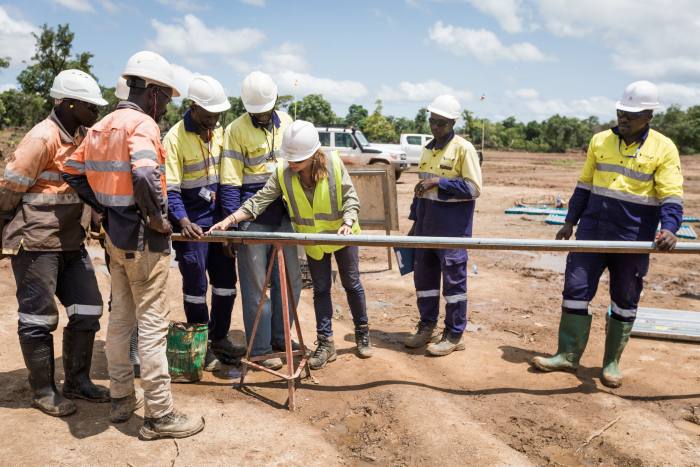[ad_1]
Charlie and Dan Betts are brothers on a mission: to improve responsible sourcing in the jewellery sector, by changing the mining industry. Through their Single Mine Origin brand, the two Britons aim to provide a mass-market service that addresses the traceability of gold.
They brought that ambition a step closer when they signed up the multinational group Endeavour Mining as SMO’s first partner. But there is much more to do: in November, a Human Rights Watch report focused on 15 leading jewellers concluded that most were “not able to trace their gold and diamonds to the mines of originâ€.
So what is the brothers’ concept and what impact could it have on the jewellery industry? SMO is a joint venture between Betts Group, a 261-year-old UK refiner and bullion dealer headed by Charlie, who represents the ninth consecutive generation of his family to take the helm, and the gold exploration, development and production company Hummingbird Resources, of which Dan is chief executive.
It aims to respond to growing demand in the jewellery industry for responsibly sourced, traceable gold. This, says Charlie, is being driven by increasing consumer engagement with provenance and ethics, and jewellers “looking harder at their supply chainâ€.
SMO provides a chain of custody for every gramme of its gold, from mine to retailer. A batch is segregated at the mine — currently Hummingbird Resources’ Yanfolila site in Mali — and sent to a refinery in Switzerland accredited by the London Bullion Market Association. An audit by certification company Bureau Veritas confirms the gold has been refined in segregation. The gold is then brought to the UK and Betts supplies jewellers. A subsidiary of accountancy firm Baker Tilly International has provided process assurance for the chain of custody.

Models already exist that allow gold to be segregated and traced from a mine to a finished product, but Charlie says they are “quite niche†and have a premium attached.
For example, there are 15 certified Fairtrade artisanal mines in Peru, whose miners receive a minimum price for their gold (95 per cent of the LBMA price) plus a premium of £2,000 per kilogramme. Similarly, Fairmined, set up by the non-profit Alliance for Responsible Mining in Colombia, works with six small mines in Colombia and Peru. Authorised buyers, such as refineries, pay a premium for the gold, creating a knock-on effect in the supply chain.
These initiatives are part of the picture, says Charlie, but he suggests SMO can “go a lot further†and be “a viable mass-market solutionâ€.

Betts Group has moved all internal production to SMO gold and is picking up the estimated additional 2 per cent cost of segregation across the supply chain. “It definitely impacts our margins as a manufacturer and supplier to the trade, but . . . we have an exceptional opportunity here to change the way things work and hopefully that will come back and benefit us because we’ll increase market share,†says Charlie.
As a result, the company’s 2,000-plus jewellery customers are using SMO gold. Of these, “tens†are so far engaged with the concept and pushing it in their marketing, according to Charlie.
Deakin & Francis, a UK jeweller that created the first pieces made with SMO gold — a pair of elephant cufflinks — will publicise its use of the metal shortly. Managing director Henry Deakin says customers had started to ask where the company’s gold came from. “Customers want it to be traceable,†he says. Knowing the provenance of the gold for a purchase such as a signet ring is “an added benefit to the saleâ€, says Deakin.
SMO plans to supply a QR code with jewellery that links to details of where and when the gold was mined and information about the mine — such as the social, environmental and community projects it runs. Bespoke content can be created with individual jewellers. Deakin & Francis is aiming to go a step further. “We are looking to see if we can laser-engrave the QR code into the back of the jewellery,†says Deakin.
To date, Betts has supplied about 5,000 ounces of SMO gold (total value $10m) but expects demand to rise.
Having proved the concept with Betts Group and Hummingbird Resources over the past few years, the joint venture signed a membership agreement with Endeavour, which listed on the London Stock Exchange last month, to use its Ity mine in Ivory Coast.
“It’s not [that] we’re trying to channel another way to sell our gold; we don’t have any issues in selling our gold,†says Sébastien de Montessus, Endeavour chief executive. “It’s more a responsible approach on supporting an initiative that we feel is very interesting and appealing to the final consumer.â€
He is keen to tell the community story behind the gold — that it was produced in a mine with “a track record of being operated to the best international standards and is socially and environmentally responsibleâ€. He says: “It’s a way to showcase the good things that we are trying to do as a business in producing that gold.â€
Dan Betts says SMO can raise the profile of what responsible mines are doing by providing exposure. “Even though the retail jewellery market is small in terms of demand [for gold], it’s huge in terms of influence,†he says.
Each SMO mine must pay an annual membership fee and be signed up to the World Gold Council’s Responsible Gold Mining Principles, which relate to environmental, social and governance commitments, or equivalent standards from the Initiative for Responsible Mining Assurance, or from the International Council on Mining & Metals.
De Montessus believes — as, of course, do the Betts brothers — that other mines should follow Endeavour’s lead and support SMO.
Â
[ad_2]
Source link






